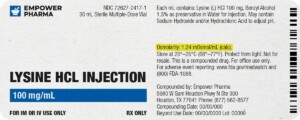Common side effects of antidepressants like fluoxetine may include gastrointestinal disturbances like nausea, vomiting, diarrhea, abdominal pain, and constipation. Fluoxetine may also lead to weight fluctuations.[12]
Less common effects may include rare extrapyramidal symptoms, such as dystonia, and torticollis.[13] Fluoxetine may also trigger manic episodes, particularly in individuals with undiagnosed bipolar disorder.[1]
Fluoxetine may potentially cause serious side effects such as serotonin syndrome, a potentially life-threatening condition characterized by various symptoms, including agitation, hallucinations, rapid heart rate, and fluctuating blood pressure.[11]
The risk of suicidal ideation and behavior, particularly in adolescents and young adults, may demand close observation, especially when initiated.[1]
Fluoxetine may also potentially increase the risk of glaucoma in certain susceptible populations, although rare.[14]
Abrupt discontinuation of fluoxetine may lead to withdrawal symptoms such as mood changes, irritability, agitation, dizziness, numbness or tingling in the hands or feet, anxiety, sweating, confusion, headache, tiredness, and difficulty falling asleep or staying asleep.[15]
Fluoxetine may increase the risk of bleeding and should be used cautiously in certain populations. This potential risk is attributed to fluoxetine’s effect on serotonin reuptake in platelets, which may impair normal clotting function. Patients with a history of bleeding disorders, and those taking anticoagulants or antiplatelet agents concomitantly may be at a higher risk.[16]
Adults may report side effects such as insomnia, nausea, diarrhea, anorexia, dry mouth, headache, drowsiness, anxiety, nervousness, yawning, bruising, and potential occurrences of seizures and bleeding. Other notable effects may include hyperhidrosis, potential for mania, and activation of suicidal ideation and behavior, particularly in teenagers. Weight changes, decreased orgasm (anorgasmia and ejaculation latency), muscle weakness, tremors, and pharyngitis may also be associated with fluoxetine.[1]
Additional side effects may include nervousness, anxiety, sleep disturbances, heartburn, weakness, uncontrollable shaking, unusual dreams, and nasal congestion. Sexual issues may arise for both genders, with men potentially experiencing decreased sex drive, erectile difficulties, or delayed/absent ejaculation, while women may potentially face reduced sex drive or delayed orgasms. Cognitive effects such as confusion, difficulty concentrating, and memory problems may also occur.[1]
NOTE: This list may not include all possible adverse reactions or side effects.


 Mirtazapine Tablets
Mirtazapine Tablets Trazodone Tablets
Trazodone Tablets Ketamine Nasal Spray
Ketamine Nasal Spray Sertraline Tablets
Sertraline Tablets Ketamine Troches
Ketamine Troches Ketamine ODT
Ketamine ODT Bupropion HCl SR Tablets
Bupropion HCl SR Tablets